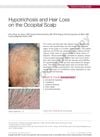
The research found that people's hair proteins vary by individual and body part, with some differences between ethnic groups, which could help in forensics.
 January 2012 in “조직공학과 재생의학”
January 2012 in “조직공학과 재생의학” The study found that certain three-dimensional scaffolds can help regenerate hair effectively.
 November 2011 in “APMIS. Acta pathologica, microbiologica et immunologica Scandinavica./APMIS”
November 2011 in “APMIS. Acta pathologica, microbiologica et immunologica Scandinavica./APMIS” Polyomavirus A2 infection in newborn mice caused hair follicle tumors.
January 2008 in “Chinese Journal of Spectroscopy Laboratory” Cysteine formation on hair indicates damage, best detected at pH 4.5.

Hair coloring and bleaching can permanently break down hair protein and temporarily change its properties.
January 2007 in “The FASEB journal” Human hair keratins help nerve regeneration and support Schwann cell activity.
September 2004 in “PubMed” Hair grows in three stages: growing, transition, and resting.
 January 1997 in “Elsevier eBooks”
January 1997 in “Elsevier eBooks” Hair and nails are skin parts that develop early and serve protective and functional roles.
 January 1963 in “Stain technology”
January 1963 in “Stain technology” Ziehl-Neelsen's stain helps identify different parts of hair in sheep and goats.
 June 2024 in “Majallah-i dānishgāh-i ̒ulum-i pizishkī-i Kirmān.”
June 2024 in “Majallah-i dānishgāh-i ̒ulum-i pizishkī-i Kirmān.” Eucalyptus and Tween 80 most effectively increase cetirizine skin absorption.
 June 2024 in “British Journal of Dermatology”
June 2024 in “British Journal of Dermatology” KRT14 gene variants cause dermatopathia pigmentosa reticularis, affecting nails, teeth, and hair.

Blocking the Mitochondrial Pyruvate Carrier causes stress in hair follicles, which can be reduced by an ISR inhibitor.

Applying thyroid hormones to the scalp can help hair grow.
 June 2024 in “ChemBioChem”
June 2024 in “ChemBioChem” Replenishing free 18-MEA can help restore damaged hair surfaces.
 April 2024 in “Skin appendage disorders”
April 2024 in “Skin appendage disorders” Environmental pollutants can damage hair health and cause hair loss.
 April 2024 in “International journal of clinical trials”
April 2024 in “International journal of clinical trials” SesZen-Bio™ improves hair density, thickness, and overall hair health.
March 2024 in “International journal of molecular sciences” Three specific genetic variants cause severe skin issues in children with EBS, highlighting the need for early genetic screening.
 February 2024 in “Archiv EuroMedica”
February 2024 in “Archiv EuroMedica” Annurca apple extract may help with hair growth and prevent hair loss.
 January 2024 in “Diagnostic cytopathology”
January 2024 in “Diagnostic cytopathology” Trichilemmal carcinoma can spread to the parotid gland and be diagnosed using fine-needle aspiration cytology.
 January 2024 in “Skin appendage disorders”
January 2024 in “Skin appendage disorders” A man with follicular psoriasis got better after treatment with skin cream and allergy pills.
 December 2023 in “Journal of comparative pathology”
December 2023 in “Journal of comparative pathology” A dog had a rare skin cyst, known as a dilated pore of Winer, surgically removed from its neck.
 November 2023 in “International surgery journal”
November 2023 in “International surgery journal” A man's neck lump was a trichilemmal cyst, not cancer, and should be fully removed due to rare risk of becoming malignant.
 September 2023 in “International Journal of Community Medicine and Public Health”
September 2023 in “International Journal of Community Medicine and Public Health” Different sebaceous gland diseases can be treated with medications, hormone therapy, or surgical methods.
 September 2023 in “Cells tissues organs”
September 2023 in “Cells tissues organs” Mice skin matures by day 200, leading to aging signs like curved hair follicles and white hairs due to changes in skin stem cells.
 September 2023 in “Cutis”
September 2023 in “Cutis” A baby girl has a hair disorder called monilethrix, causing fragile hair that may improve over time.
 August 2023 in “British journal of dermatology/British journal of dermatology, Supplement”
August 2023 in “British journal of dermatology/British journal of dermatology, Supplement” Rubbing or pressing on the face can cause small bumps, and changing posture along with certain creams can improve them.
 July 2023 in “Veterinary pathology”
July 2023 in “Veterinary pathology” White-tailed deer can get a hair loss condition that might make them more vulnerable to environmental threats.
 June 2023 in “Hanguk ingeurie hakoeji”
June 2023 in “Hanguk ingeurie hakoeji” Eating fermented protein made from black bean powder twice a day for 60 days improved hair density but not scalp condition or hair thickness.
 April 2023 in “The journal of investigative dermatology/Journal of investigative dermatology”
April 2023 in “The journal of investigative dermatology/Journal of investigative dermatology” The study found that a key immune pathway protecting hair follicles is reduced in a mouse model of scarring hair loss.
 April 2023 in “The journal of investigative dermatology/Journal of investigative dermatology”
April 2023 in “The journal of investigative dermatology/Journal of investigative dermatology” Tet2 and Tet3 enzymes are important for controlling hair growth and shape by affecting gene activity and DNA structure in hair follicles.

























